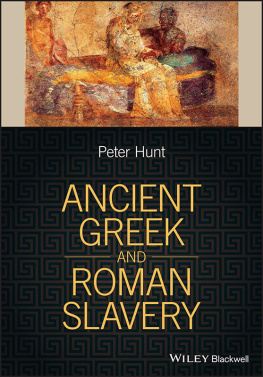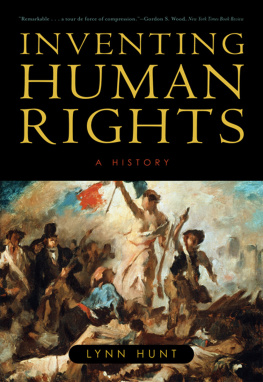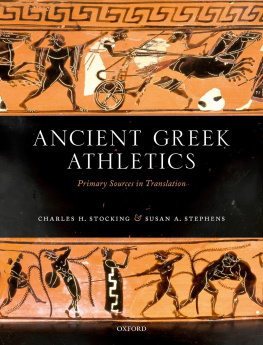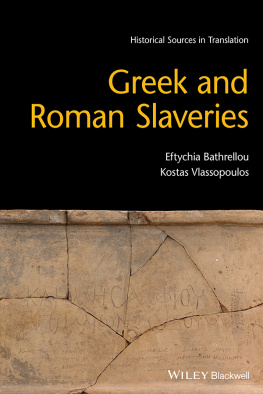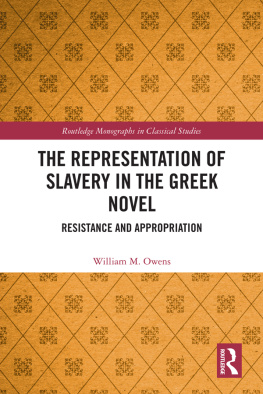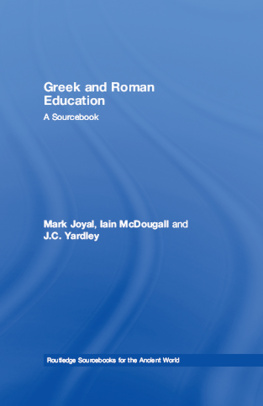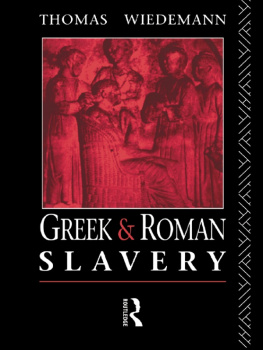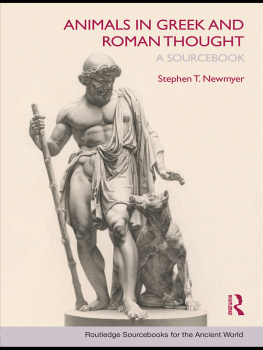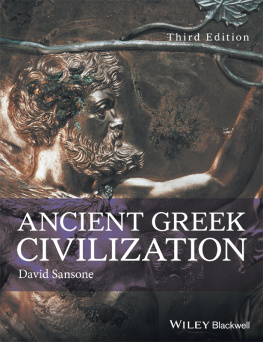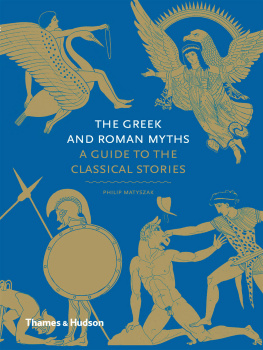Hunt - Ancient Greek and Roman Slavery
Here you can read online Hunt - Ancient Greek and Roman Slavery full text of the book (entire story) in english for free. Download pdf and epub, get meaning, cover and reviews about this ebook. year: 2017, publisher: John Wiley & Sons, Incorporated, genre: Religion. Description of the work, (preface) as well as reviews are available. Best literature library LitArk.com created for fans of good reading and offers a wide selection of genres:
Romance novel
Science fiction
Adventure
Detective
Science
History
Home and family
Prose
Art
Politics
Computer
Non-fiction
Religion
Business
Children
Humor
Choose a favorite category and find really read worthwhile books. Enjoy immersion in the world of imagination, feel the emotions of the characters or learn something new for yourself, make an fascinating discovery.
Ancient Greek and Roman Slavery: summary, description and annotation
We offer to read an annotation, description, summary or preface (depends on what the author of the book "Ancient Greek and Roman Slavery" wrote himself). If you haven't found the necessary information about the book — write in the comments, we will try to find it.
Hunt: author's other books
Who wrote Ancient Greek and Roman Slavery? Find out the surname, the name of the author of the book and a list of all author's works by series.
Ancient Greek and Roman Slavery — read online for free the complete book (whole text) full work
Below is the text of the book, divided by pages. System saving the place of the last page read, allows you to conveniently read the book "Ancient Greek and Roman Slavery" online for free, without having to search again every time where you left off. Put a bookmark, and you can go to the page where you finished reading at any time.
Font size:
Interval:
Bookmark:

This book provides an introduction to pivotal issues in the study of classical (Greek and Roman) slavery. The span of topics is broad ranging from everyday resistance to slavery to philosophical justifications of slavery, and from the process of enslavement to the decline of slavery after the fall of the Western Roman Empire. The book uses a wide spectrum of types of evidence, and relies on concrete and vivid examples whenever possible.
Introductory chapters provide historical context and a clear and concise discussion of the methodological difficulties of studying ancient slavery. The following chapters are organized around central topics in slave studies: enslavement, economics, politics, culture, sex and family life, manumission and ex-slaves, everyday conflict, revolts, representations, philosophy and law, and decline and legacy. Chapters open with general discussions of important scholarly controversies and the challenges of our ancient evidence, and case studies from the classical Greek, Hellenistic, and Roman periods provide detailed and concrete explorations of the issues.
- Organized by key themes in slave studies with in-depth classical case studies
- Emphasizes Greek/Roman comparisons and contrasts
- Features helpful customized maps
- Topics range from demography to philosophy, from Linear B through the fall of the empire in the west
- Features myriad types of evidence: literary, historical, legal and philosophical texts, the bible, papyri, epitaphs, lead letters, curse tablets, art, manumission inscriptions, and more
Ancient Greek and Roman Slavery provides a general survey of classical slavery and is particularly appropriate for college courses on Greek and Roman slavery, on comparative slave societies, and on ancient social history. It will also be of great interest to history enthusiasts and scholars, especially those interested in slavery in different periods and societies.
Peter Hunt is a professor at the University of Colorado where he teaches a wide variety of courses including Greek and Roman slavery. He has written two books: Slaves, Warfare, and Ideology in the Greek Historians and War and Peace, and Alliance in Demosthenes Athens. His previous work on slavery includes chapters in the Cambridge World History of Slavery and the Oxford Handbook of Greek and Roman Slaveries as well as the slavery chapter in the Cambridge World History, vol. 4.
To Isabel and Julia
This edition first published 2018
2018 Peter Hunt
All rights reserved. No part of this publication may be reproduced, stored in a retrieval system, or transmitted, in any form or by any means, electronic, mechanical, photocopying, recording or otherwise, except as permitted by law. Advice on how to obtain permission to reuse material from this title is available at http://www.wiley.com/go/permissions.
The right of Peter Hunt to be identified as the author of this work has been asserted in accordance with law.
Registered Office
John Wiley & Sons, Inc., 111 River Street, Hoboken, NJ 07030, USA
John Wiley & Sons Ltd, The Atrium, Southern Gate, Chichester, West Sussex, PO19 8SQ, UK
Editorial Office
350 Main Street, Malden, MA 02148-5020, USA
For details of our global editorial offices, customer services, and more information about Wiley products visit us at www.wiley.com.
Wiley also publishes its books in a variety of electronic formats and by print-on-demand. Some content that appears in standard print versions of this book may not be available in other formats.
Limit of Liability/Disclaimer of Warranty
While the publisher and authors have used their best efforts in preparing this work, they make no representations or warranties with respect to the accuracy or completeness of the contents of this work and specifically disclaim all warranties, including without limitation any implied warranties of merchantability or fitness for a particular purpose. No warranty may be created or extended by sales representatives, written sales materials or promotional statements for this work. The fact that an organization, website, or product is referred to in this work as a citation and/or potential source of further information does not mean that the publisher and authors endorse the information or services the organization, website, or product may provide or recommendations it may make. This work is sold with the understanding that the publisher is not engaged in rendering professional services. The advice and strategies contained herein may not be suitable for your situation. You should consult with a specialist where appropriate. Further, readers should be aware that websites listed in this work may have changed or disappeared between when this work was written and when it is read. Neither the publisher nor authors shall be liable for any loss of profit or any other commercial damages, including but not limited to special, incidental, consequential, or other damages.
Library of Congress Cataloging-in-Publication Data
Names: Hunt, Peter, 1961- author.
Title: Ancient Greek and Roman slavery / Peter Hunt, University of Colorado, Boulder, Colorado.
Description: Hoboken, NJ : Wiley-Blackwell, 2018. | Includes bibliographical references and index. | Description based on print version record and CIP data provided by publisher; resource not viewed.
Identifiers: LCCN 2017013713 (print) | LCCN 2017017166 (ebook) | ISBN 9781119421061 (epub) | ISBN 9781405188050 (hardback) | ISBN 9781405188067 (paper)
Subjects: LCSH: SlaveryGreeceHistory. | SlaveryRomeHistory. | BISAC: LITERARY CRITICISM / Ancient & Classical.
Classification: LCC HT863 (ebook) | LCC HT863 .H86 2018 (print) | DDC 306.3/6209495dc23
LC record available at https://lccn.loc.gov/2017013713
Cover image: World History Archive / Alamy Stock Photo
Cover design by Wiley
I wrote this book with two audiences in mind. I hope it will be a useful resource for college courses on Greek and Roman slavery and a supplementary text for more general classes involving ancient social history. But it should also provide a general introduction for any other reader who wants or needs to know more about this fascinating topic, for example, those interested in comparative slave societies or in other aspects of ancient Greek or Roman culture or history. These two intended audiences have determined many aspects of this book.
In particular, within the main text I have preferred what I consider the clearest and most interesting presentations of a topic rather than the most recent. I have kept references to secondary scholarship sparse and unobtrusive, and I have confined myself to works in English whenever possible. Nevertheless, my citations and Suggested Reading sections include recent works and should provide a good start for further investigations of particular topicsfor the purpose, for instance, of research papers. I have also not hesitated to cite my own scholarly publications when these provide more detailed treatments of topics or arguments I mention. I do not claim to be a particularly important scholar of ancient slavery, but I am the one with whom I most frequently agree.
The book is organized topically rather than having a Greek and then a Roman half. Each chapter sets out a major issue in the study of slavery and considers theoretical approaches, our ancient evidence, and key controversies. Contrasts and parallels between Greek and Roman slavery usually play a role in either the introduction or conclusion of each chapter. The bodies of most chapters are devoted to case studies from classical Greece and Rome and Hellenistic examples play a role in several chapters. The focus on particular cases allows greater depth and I have been willing to forgo general coverage for the sake of this goal. For example, in Chapter 7, I focus on slave prostitutes in classical Athens but not at Rome and on slave families at Rome without attempting equal treatment for Greek cases. The quantity and richness of our evidence has often determined such choices. And even in the cases for which we seem to have the best evidence, Ill need to admit our ignorance regularly.
Next pageFont size:
Interval:
Bookmark:
Similar books «Ancient Greek and Roman Slavery»
Look at similar books to Ancient Greek and Roman Slavery. We have selected literature similar in name and meaning in the hope of providing readers with more options to find new, interesting, not yet read works.
Discussion, reviews of the book Ancient Greek and Roman Slavery and just readers' own opinions. Leave your comments, write what you think about the work, its meaning or the main characters. Specify what exactly you liked and what you didn't like, and why you think so.

